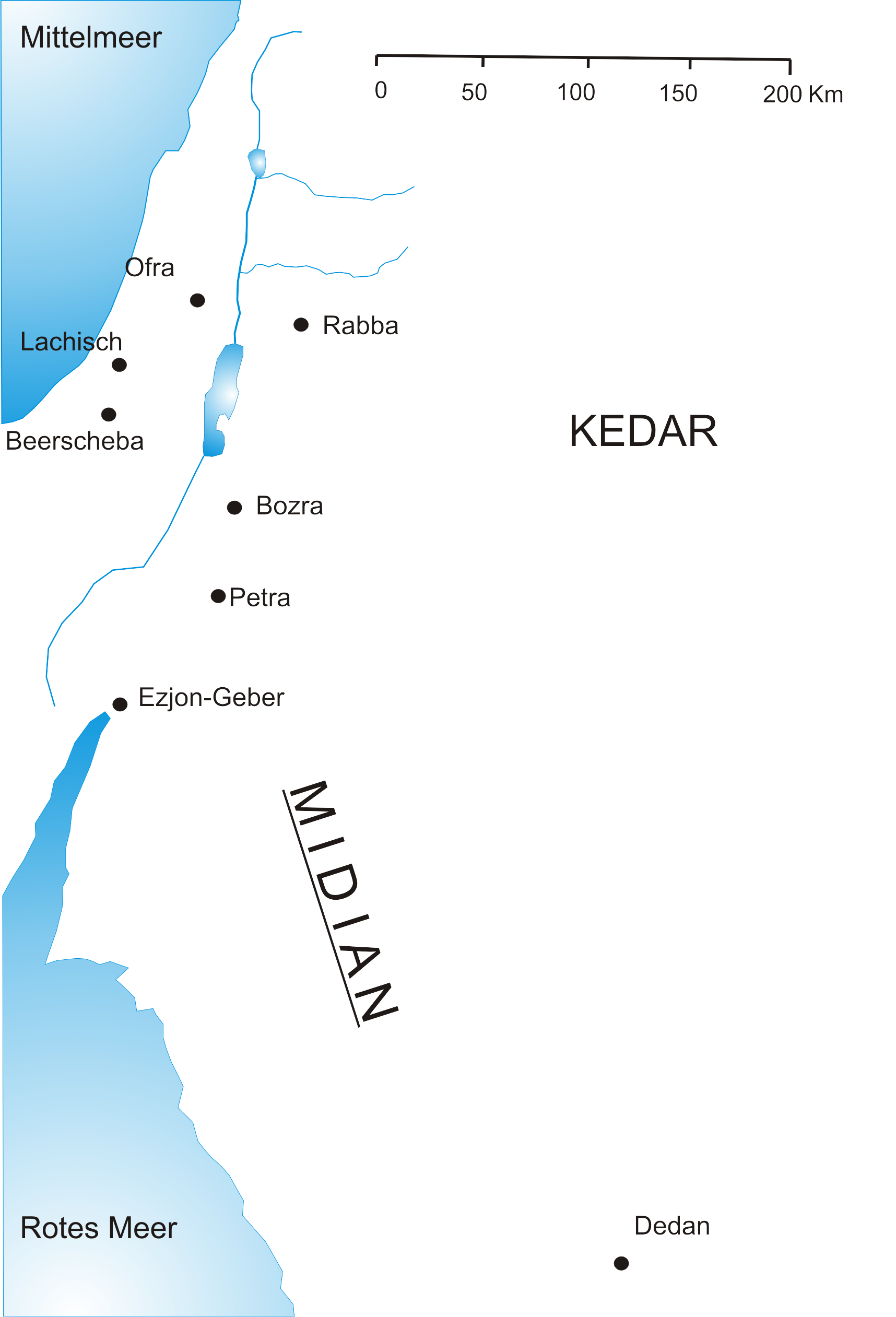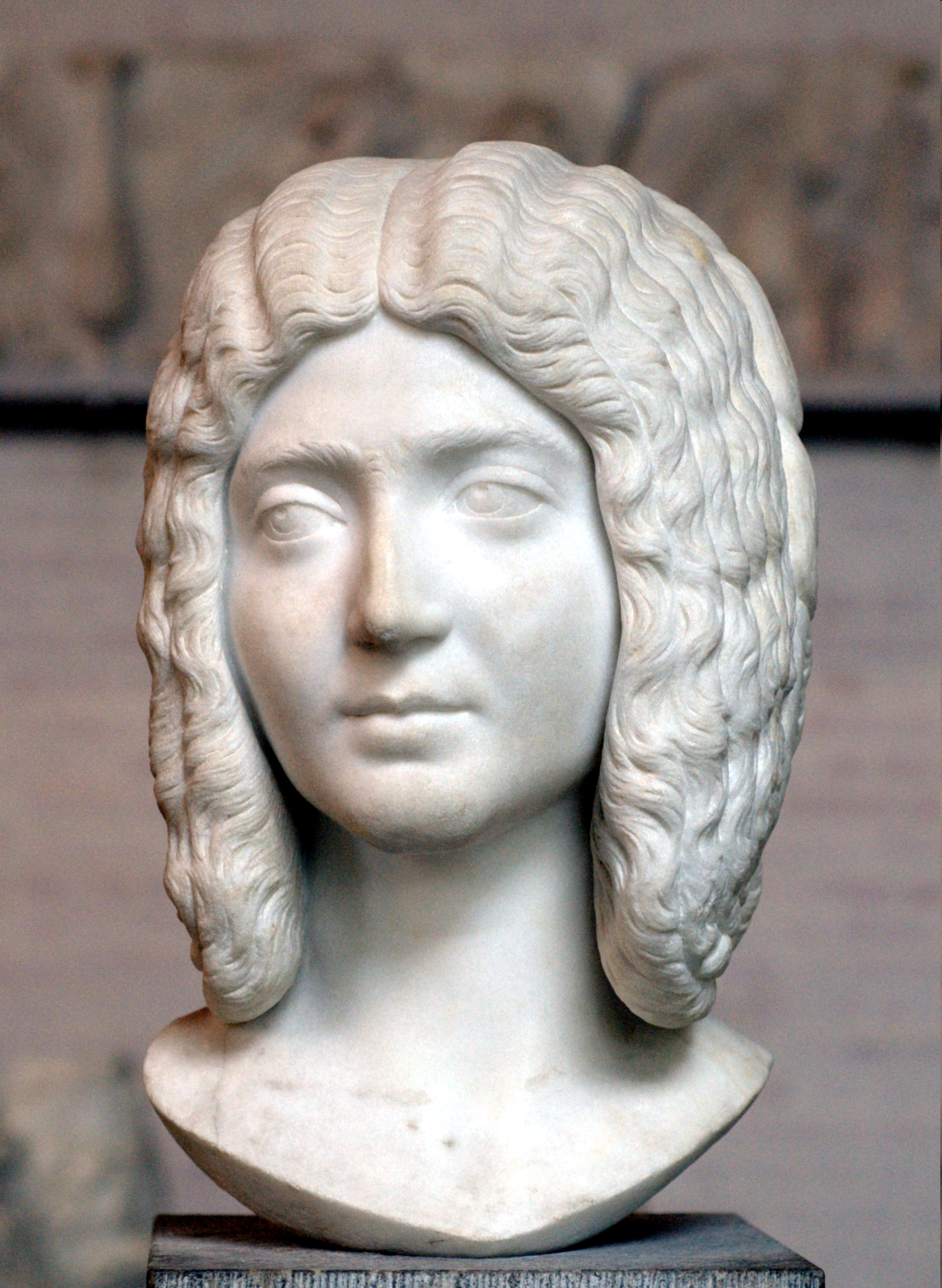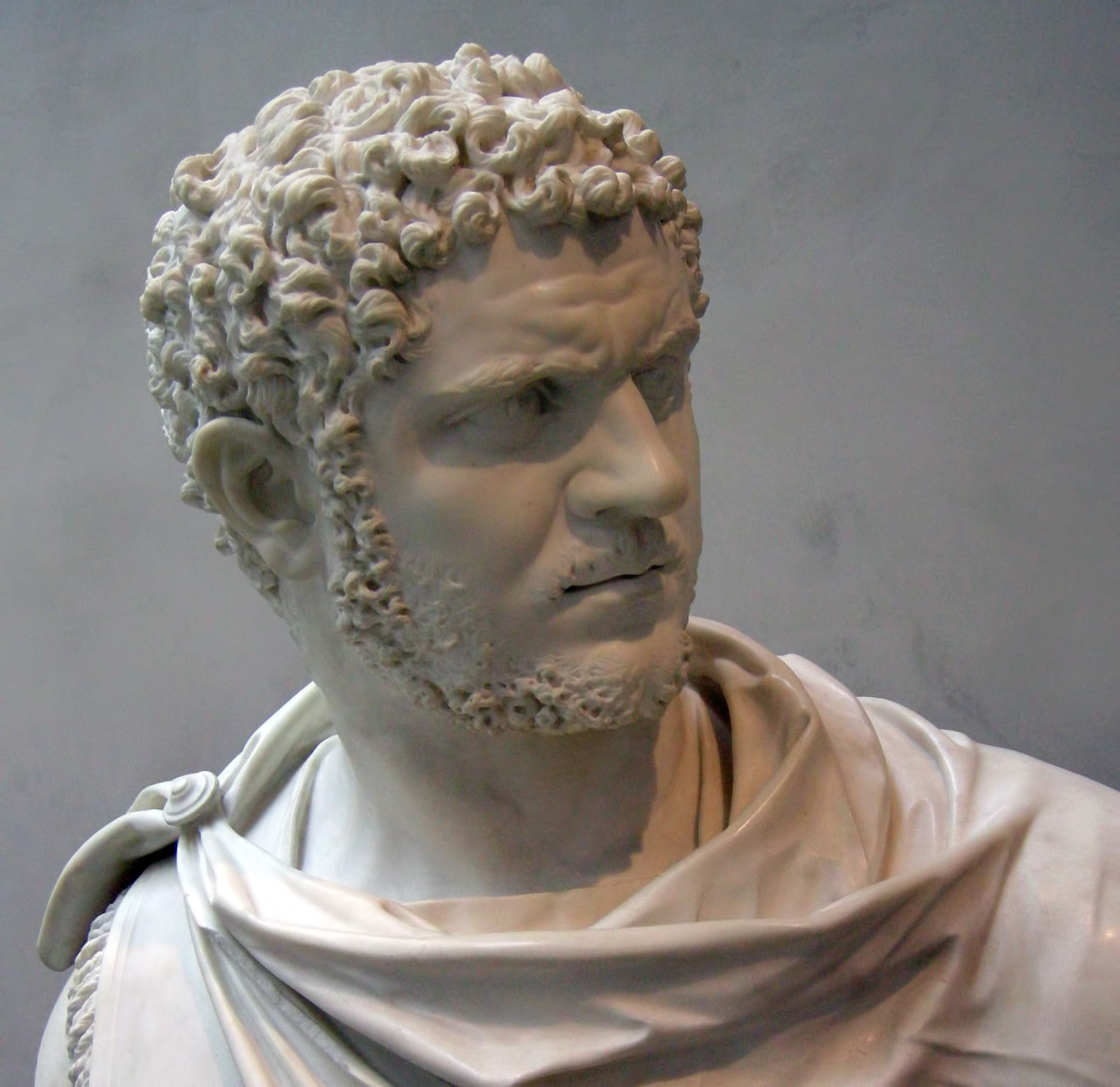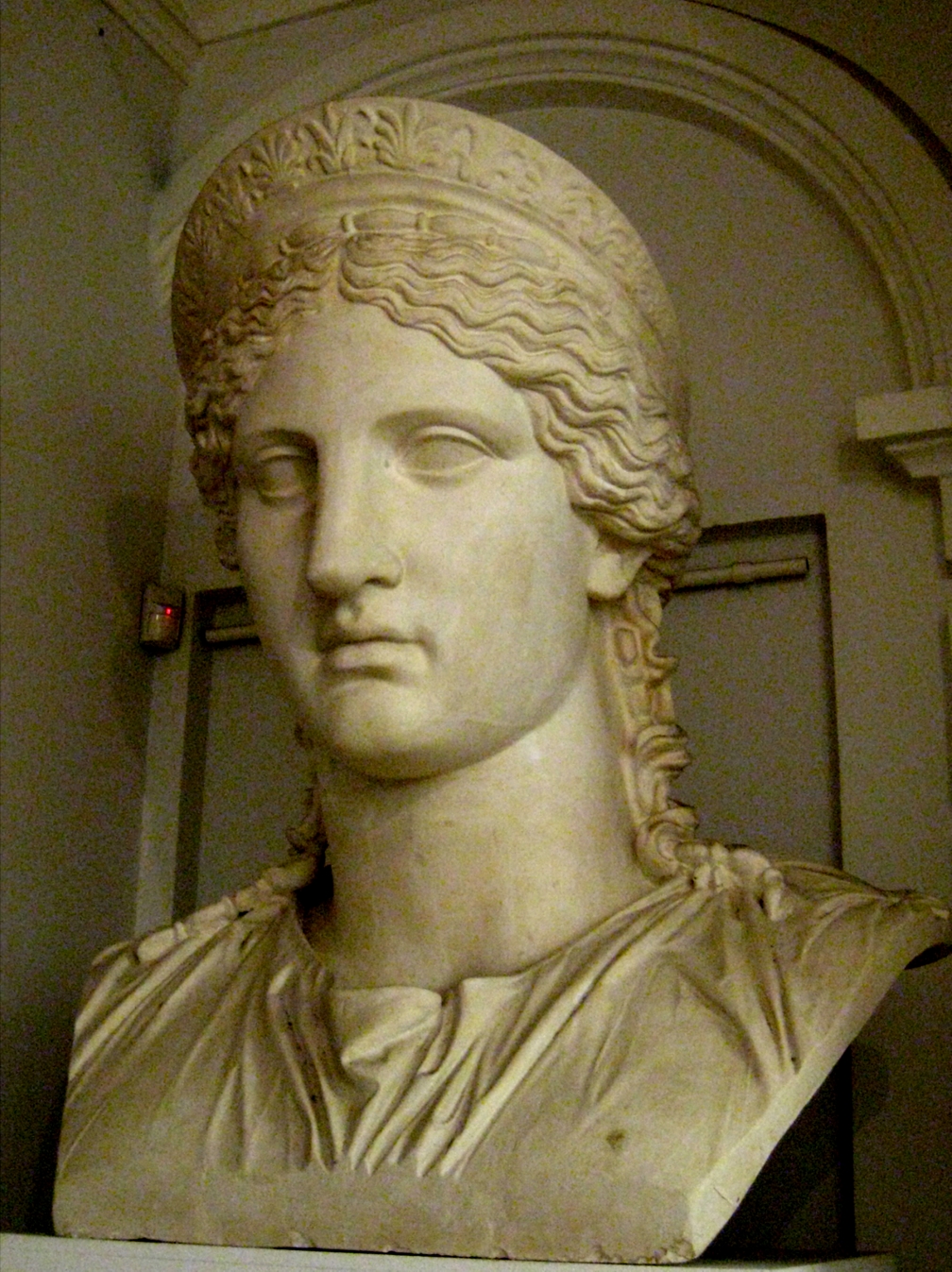|
Julia Domna
Julia Domna (; – 217 AD) was Roman empress from 193 to 211 as the wife of Emperor Septimius Severus. She was the first empress of the Severan dynasty. Domna was born in Emesa (present-day Homs) in Roman Syria to an Arab family of priests of the deity Elagabalus. In 187, she married Severus, who at the time was governor of the Roman province of Gallia Lugdunensis. They had two sons, Caracalla and Geta. A civil war over the Roman throne broke out in 193, and shortly afterwards Severus declared himself emperor. The war ended in 197 with the defeat of the last of Severus's opponents. As empress, Domna was famous for her political, social, and philosophical influence. She received titles such as "Mother of the Invincible Camps". After the elder of her sons, Caracalla, started ruling with his father, she was briefly co-empress with Caracalla's wife, Fulvia Plautilla, until the latter fell into disgrace. Following the death of Severus in 211, Domna became the first empress ... [...More Info...] [...Related Items...] OR: [Wikipedia] [Google] [Baidu] |
Severan Dynasty
The Severan dynasty, sometimes called the Septimian dynasty, ruled the Roman Empire between 193 and 235. It was founded by the emperor Septimius Severus () and Julia Domna, his wife, when Septimius emerged victorious from civil war of 193 - 197, which began with the Year of the Five Emperors. Their two sons, Caracalla () and Geta (emperor), Geta (), ruled briefly after the death of Septimius. In 217 - 218 there was a short interruption of dynasty's control over the empire by reigns of Macrinus () and his son Diadumenian () before Julia Domna's relatives assumed power by raising her two grandnephews, Elagabalus () and Severus Alexander (), in succession to the imperial office. The dynasty's women, Julia Domna, the mother of Caracalla and Geta, and her sister, Julia Maesa, the mother of Julia Soaemias and Julia Mamaea, mothers of Elagabalus and Severus Alexander respectively, were all powerful ''augusta (title), augustae''. They were also instrumental in securing imperial positions ... [...More Info...] [...Related Items...] OR: [Wikipedia] [Google] [Baidu] |
Augusta (honorific)
Augusta may refer to: Places Australia * Augusta, Western Australia Brazil * Rua Augusta (São Paulo) Canada * Augusta, Ontario * North Augusta, Ontario * Augusta Street (Hamilton, Ontario) France * Augusta Suessionum ("Augusta of the Suessii"), Soissons * Augusta Viromanduorum ("Augusta of the Viromandui"), Saint-Quentin Germany * Augusta Treverorum ("Augusta of the Treveri") or Trier * Augusta Vangionum ("Augusta of the Vangiones") or Worms * Augusta Vindelicorum ("Augusta of the Vindelici") or Augsburg Italy * Augusta, Sicily * Augusta Praetoria Salassorum ("Praetorian Augusta of the Salassi") or Aosta * Augusta Taurinorum ("Augusta of the Taurini") or Turin * Perugia or ''Augusta Perusia'' Spain * Emerita Augusta, Mérida, Spain * Caesar Augusta, Zaragoza, Spain United States * Augusta, Arkansas * Augusta Charter Township, Michigan * Augusta County, Virginia * Augusta, Georgia ** Augusta National Golf Club ("Augusta"), home of the Masters Tournament * Au ... [...More Info...] [...Related Items...] OR: [Wikipedia] [Google] [Baidu] |
Arabs
Arabs (, , ; , , ) are an ethnic group mainly inhabiting the Arab world in West Asia and North Africa. A significant Arab diaspora is present in various parts of the world. Arabs have been in the Fertile Crescent for thousands of years. In the 9th century BCE, the Assyrians made written references to Arabs as inhabitants of the Levant, Mesopotamia, and Arabia. Throughout the Ancient Near East, Arabs established influential civilizations starting from 3000 BCE onwards, such as Dilmun, Gerrha, and Magan, playing a vital role in trade between Mesopotamia, and the Mediterranean. Other prominent tribes include Midian, ʿĀd, and Thamud mentioned in the Bible and Quran. Later, in 900 BCE, the Qedarites enjoyed close relations with the nearby Canaanite and Aramaean states, and their territory extended from Lower Egypt to the Southern Levant. From 1200 BCE to 110 BCE, powerful kingdoms emerged such as Saba, Lihyan, Minaean, Qataban, Hadhramaut, Awsan, and ... [...More Info...] [...Related Items...] OR: [Wikipedia] [Google] [Baidu] |
Julia Soaemias
Julia Soaemias Bassiana (180 – 11 March 222) was a Syrian noblewoman and the mother of Roman emperor Elagabalus, who ruled over the Roman Empire from 218 to 222. She was one of his chief advisors, initially with the support and accompaniment of her mother Julia Maesa. She and her mother guided the young emperor until growing unrest and a family division led to her son's replacement by her nephew Severus Alexander. Julia Soaemias was killed along with her son by the Praetorian Guard. Julia Soaemias was born and raised in Emesa, Syria and through her mother was related to the Royal family of Emesa, and through marriage, to the Severan dynasty of Ancient Rome. Family She was the first daughter of the powerful Syrian Roman noblewoman Julia Maesa and Gaius Julius Avitus Alexianus, sister of Julia Avita Mamaea, niece of Julia Domna, and a niece by marriage of Emperor Lucius Septimius Severus. At some point, she married Syrian equestrian and politician Sextus Varius Marcel ... [...More Info...] [...Related Items...] OR: [Wikipedia] [Google] [Baidu] |
Gaius Julius Avitus Alexianus
Gaius Julius Avitus AlexianusHazel, ''Who's who in the Roman World'', p. 34 (died 217) was a Roman nobleman of Syria and held high military and political commands. Background and career Although Alexianus was a Roman citizen who was born and raised in Emesa (modern Homs, Syria), little is known on his origins. It has been assumed that Alexianus was born in c. 155."Gaius Julius Avitus Alexianus" at Livius.org (last accessed 21 June 2020) What is known about him is from surviving inscriptional and Roman historical evidence. Through marriage he was a relation to the and the ruling |
Baal
Baal (), or Baʻal, was a title and honorific meaning 'owner' or 'lord Lord is an appellation for a person or deity who has authority, control, or power (social and political), power over others, acting as a master, chief, or ruler. The appellation can also denote certain persons who hold a title of the Peerage o ...' in the Northwest Semitic languages spoken in the Levant during Ancient Near East, antiquity. From its use among people, it came to be applied to gods. Scholars previously associated the theonym with solar god, solar cults and with a variety of unrelated patron deity, patron deities, but inscriptions have shown that the name Ba'al was particularly associated with the storm god, storm and fertility god Hadad and his local manifestations. The Hebrew Bible includes use of the term in reference to various Levantine mythology, Levantine deities, often with application towards Hadad, who was decried as a false god. That use was taken over into Christianity and Isl ... [...More Info...] [...Related Items...] OR: [Wikipedia] [Google] [Baidu] |
Arab
Arabs (, , ; , , ) are an ethnic group mainly inhabiting the Arab world in West Asia and North Africa. A significant Arab diaspora is present in various parts of the world. Arabs have been in the Fertile Crescent for thousands of years. In the 9th century BCE, the Assyrians made written references to Arabs as inhabitants of the Levant, Mesopotamia, and Arabia. Throughout the Ancient Near East, Arabs established influential civilizations starting from 3000 BCE onwards, such as Dilmun, Gerrha, and Magan (civilization), Magan, playing a vital role in trade between Mesopotamia, and the History of the Mediterranean region, Mediterranean. Other prominent tribes include Midian, ʿĀd, and Thamud mentioned in the Hebrew Bible, Bible and Quran. Later, in 900 BCE, the Qedarites enjoyed close relations with the nearby Canaan#Canaanites, Canaanite and Aramaeans, Aramaean states, and their territory extended from Lower Egypt to the Southern Levant. From 1200 BCE to 110 BCE, powerful ... [...More Info...] [...Related Items...] OR: [Wikipedia] [Google] [Baidu] |
Julia Maesa
Julia Maesa (7 May before 160 AD – AD) was a member of the Severan dynasty of the Roman Empire who was the grandmother of emperors Elagabalus and Severus Alexander, elder sister of empress Julia Domna, and mother of Julia Soaemias and Julia Mamaea. She wielded influence during the reigns of her grandsons as List of Augustae, Augusta of the Empire from 218 to her death, especially on their elevation to emperors. Born in Homs, Emesa, Roman Syria, Syria (modern day Homs), to an Arab family of priests of the deity Elagabalus (deity), Elagabalus, Maesa and her sister Domna were the daughters of Julius Bassianus. Through her sister's marriage, Maesa became sister-in-law to Septimius Severus and aunt of Caracalla and Geta (emperor), Geta, who all became emperors. She married fellow Syrian Julius Avitus, who was of consular rank. They had two daughters, Soaemias and Mamaea, who became mothers of Elagabalus and Severus Alexander, respectively. As one of the Severan dynasty's prominen ... [...More Info...] [...Related Items...] OR: [Wikipedia] [Google] [Baidu] |
Antakya
Antakya (), Turkish form of Antioch, is a municipality and the capital Districts of Turkey, district of Hatay Province, Turkey. Its area is . Prior to the devastating 2023 Turkey–Syria earthquakes, 2023 earthquakes, its population was recorded at 399,045 (2022). It is in the Hatay Province, which is the southernmost region of Turkey. The city is located in a well-watered and fertile valley on the Orontes River, about from the Levantine Sea. Today's city stands partly on the site of the ancient Antiochia (also known as "Antioch on the Orontes"), which was founded in the fourth century BC by the Seleucid Empire. Antioch later became one of the Roman Empire's largest cities and was made the capital of the provinces of Roman Syria, Syria and Coele-Syria (Roman province), Coele-Syria. It was also an influential early center of Christianity; the New Testament asserts that the name "Christian" first emerged in Antioch. The city gained much ecclesiastical importance during the times o ... [...More Info...] [...Related Items...] OR: [Wikipedia] [Google] [Baidu] |
Parthian War Of Caracalla
The Parthian war of Caracalla was an unsuccessful campaign by the Roman Empire under Caracalla against the Parthian Empire in 216–17 AD. It was the climax of a four-year period, starting in 213, when Caracalla pursued a lengthy campaign in central and eastern Europe and the Near East. After intervening to overthrow rulers in client kingdoms adjoining Parthia, he invaded in 216 using an abortive wedding proposal to the Parthian king Artabanus's daughter as a ''casus belli''. His forces carried out a campaign of massacres in the northern regions of the Parthian Empire before withdrawing to Asia Minor, where he was assassinated in April 217. The war was ended the following year after Parthian victory at the Battle of Nisibis, with the Romans paying a huge sum of war reparations to the Parthians. Events leading up to the war In the years immediately before the war, Parthia was roiled by a conflict between the two sons of King Vologases V. Vologases VI succeeded his father in 2 ... [...More Info...] [...Related Items...] OR: [Wikipedia] [Google] [Baidu] |
List Of Augustae
(; plural ; ) was a Roman Empire, Roman imperial honorific title given to List of Roman and Byzantine empresses, empresses and women of the imperial families. It was the Feminine gender, feminine form of ''Augustus (title), Augustus''. In the third century, could also receive the titles of ("Mother of the Senate"), ("Mother of the Camp"), and ("Mother of the Fatherland"). could issue their own coinage, wear imperial regalia, and rule their own Royal court, courts. Agrippina the Younger, Agrippina, the wife of Claudius, was the first living wife of the emperor in Roman history to receive the title of , a position she held for the rest of her life, ruling with her husband and son. In the third century, Julia Domna was the first empress to receive the combined title after the death of her husband Septimius Severus, which may have implied greater powers being vested in her than was usual for a Roman empress mother. In this official position and honor, she accompanied her s ... [...More Info...] [...Related Items...] OR: [Wikipedia] [Google] [Baidu] |
Empress Dowager
Empress dowager (also dowager empress or empress mother; ) is the English language translation of the title given to the mother or widow of a monarch, especially in regards to Chinese, Japanese, Korean, or Vietnamese monarchs in the Chinese cultural sphere. The term however, is applied well beyond just East Asia. The title was also given occasionally to another woman of the same generation, while a woman from the previous generation was sometimes given the title of grand empress dowager (). An empress dowager wielded power over the harem and imperial family. Numerous empress dowagers held regency during the reign of underage emperors. Many of the most prominent empress dowagers also extended their control for long periods after the emperor was old enough to govern. This was a source of political turmoil according to the traditional view of Chinese history. In Europe, the title dowager empress was given to the wife of a deceased Emperor of Russia or Holy Roman Emperor. ... [...More Info...] [...Related Items...] OR: [Wikipedia] [Google] [Baidu] |









